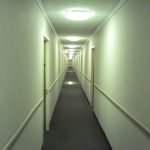Landlords have a duty to maintain their property in a reasonably safe condition. A landlord may be liable for injuries resulting from its failure to maintain the property in a reasonably safe condition under the circumstances. In Daly v. 9 East 36th LLC, the Supreme Court of New York County considered the potential liability of a landlord for a house fire.
 The apartment was a 700-square foot studio with a main room, a gallery kitchen, three closets, a hall, and a bathroom. There were seven electrical outlets in the apartment and a fuse box with two fuses.
The apartment was a 700-square foot studio with a main room, a gallery kitchen, three closets, a hall, and a bathroom. There were seven electrical outlets in the apartment and a fuse box with two fuses.
The plaintiff used several extension cords throughout the apartment, with two or three in the living room area. On the day of the fire, he had the television, the VCR, a lamp, and a fan plugged into the extension cords in the living room when he went to bed. He woke up in the burn unit of the hospital.
He had previously complained to the building superintendent that his apartment needed new and additional outlets and that he had to use extension cords. He also complained that there were blown fuses a couple of times per week. The superintendent told the plaintiff that he was working on it, but he had been told that the owners did not intend to update the apartment’s electrical system. The superintendent never told the plaintiff his request was denied. The apartment below the plaintiff’s, however, had an updated electrical system.
The superintendent testified that he may have seen three extension cords in the apartment before the fire. The plaintiff alleged that he had told the superintendent that the extension cords got very hot within an hour, but the superintendent denied having such a conversation.
The plaintiff filed suit against the landlord, and the defendant moved for summary judgment. Generally, a property owner is liable for an injury arising from an incident on its premises if the injury was caused by a dangerous or defective condition existing on the property at the time of the accident, and the property owner either created or had actual or constructive notice of the condition and time to correct it. The defendant on a motion for summary judgment must show that it did not create the condition or have actual or constructive notice of it.
The court granted summary judgment as to the claim that the defendant created the condition, finding no evidence in the record indicated that the fire started in the apartment’s electrical system. The Fire Marshall’s report indicated that the fire started about three feet from the wall, likely from an extension cord. The court further noted that the landlord was not legally required to update the electrical system, and there was no evidence that it was dangerous when it was installed.
The court then considered the summary judgment motion as to the defendant’s knowledge of the condition and failure to remedy it. The court pointed out that a landlord has a duty to maintain its property in a reasonably safe condition, based on the circumstances. Whether a particular situation involves a dangerous or defective condition depends on the circumstances and is generally decided by the jury. Here, there was evidence that the defendant knew that the system was old and that the fuses frequently blew out. The superintendent had also seen that the plaintiff was using multiple extension cords. The plaintiff had complained about the electrical system to the superintendent multiple times. There was also conflicting evidence as to whether the defendant knew that the extension cords were overheating. The court denied the summary judgment motion, finding sufficient evidence to raise a triable issue of fact.
The court also noted that there was an expert affidavit that stated the accident was caused by the owner’s negligence “in providing an inferior inadequate and unsafe electrical supply system…” The affidavit was unrebutted. The court pointed out that the defendant would have an opportunity to examine the expert at trial.
The court also addressed the defendant’s argument that the plaintiff’s use of his own extension cords caused the fire. Pursuant to CPLR 1411, the plaintiff’s culpable conduct does not bar compensation but instead reduces the amount of damages proportionately. Furthermore, the jury must decide if the plaintiff’s conduct constituted comparative fault.
The court granted summary judgment to the extent the defendant did not create the dangerous condition but otherwise denied it.
This case illustrates a landlord’s duty to its tenants. Our premises liability attorney understands landlord liability law. If you have been injured as a result of your landlord’s failure to maintain the property in a reasonably safe condition, call us to set up an appointment.
The Law Offices of Nicholas Rose, PLLC offers free consultations. Call 1-877-313-7673.
More Blog Entries:
Powers v 31 E 31 LLC – New York Apartment Fall Liability Lawsuit to Proceed, Nov. 8, 2014, New York City Injury Lawyer Blog
Image: FreeImages.com / Nic X






